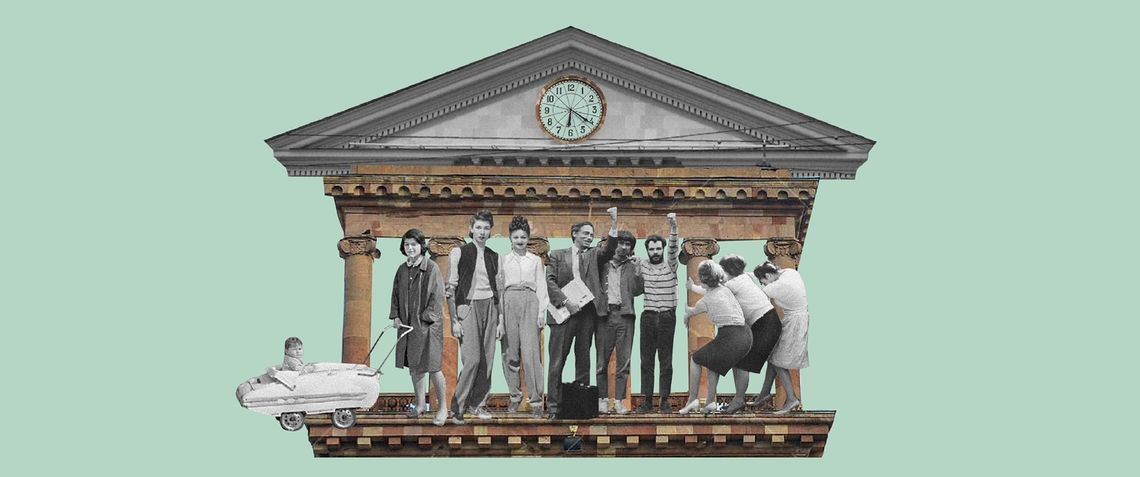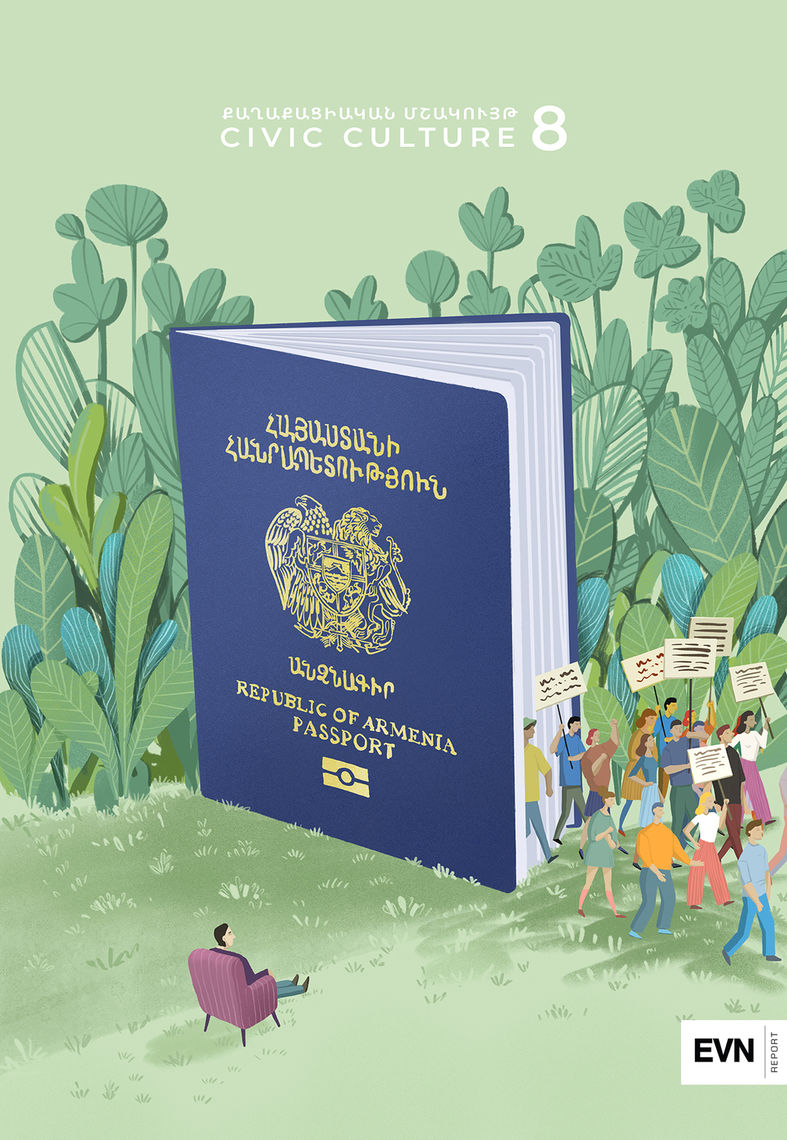

Illustration by Armine Shahbazyan.
After the 2018 Velvet Revolution, the role of civil society in bringing about political change was brought to the forefront. What was the impact of civil movements, formal and informal institutions and groups, on the maturation and implementation of that political process, and how would they continue their activity in a new situation? Many believed that civil society should change its approaches, formal institutions, work style and language because the situation had completely changed in 2018. New people who had been actively involved in social movements and would act with new values and methods had taken the helm, including activists, public figures and NGO representatives. There were opinions that the newly-formed government should be treated less critically; they were inexperienced, they will learn, they need time, and civil society should give them that opportunity. There were also views that civil society should continue its function of ensuring accountability, consistency and public oversight, otherwise the inexperienced would find themselves in “greenhouse”-like conditions and in the realm of total irresponsibility.
Of course, there are groups that target civil society, fabricate conspiracy theories, and influence public fears and prejudices, but they are guided by anti-democratic approaches specific to totalitarian regimes that reject modern perceptions of human rights. Thus, the misleading approaches voiced by these groups are not the focus of this article. The reason for the emergence of these opinions and views is that civil society has not yet figured out what role it needs to play in the establishment of a democratic state, what role it plays in the system for the protection of human rights and fundamental freedoms. In order to clarify such issues, let us consider the role and importance of civil society in the context of a democratic state and the specificities of the influence of NGOs in countries that are in democratic transition, and in particular in Armenia.
The Foundations, Role and Importance of the Formation of Civil Society
In modern perceptions of civil society, in addition to governmental institutions and political parties, non-governmental organizations, formal and informal groups established on the principle of volunteerism and common interests, carry out an important mission in the process of organization and management of public life. Civil society is a way of organizing and managing public life, where the central value, the main actor and the ultimate goal is the citizen with their interests, needs and rights.
A free person is the supreme value of civil society. Only a state where natural rights and freedoms are recognized as the supreme value can be called democratic and governed by the rule of law.
The roots of human values and the perception of civil society date back to the Enlightenment, when social theorists such as Baruch Spinoza, John Locke, and Montesquieu formulated the civil structure of society as opposed to the “state of nature.” By taking on commitments toward each other, people are organized into a state, receiving the status of citizen. The state takes on the responsibility of protecting their lives and possessions, and is granted the power of enforcement against those who break the peace.
Later, these ideas became stronger, and the establishment of civil society institutions became a necessary condition for the establishment of a democratic state in parallel with the improvement of state institutions. Today, it is impossible to solve many issues of public importance, including those related to the protection of human rights in the system of state and public administration, without the active participation of society.
The course of the history of the foundation of human rights NGOs is linked to one of the leading institutions in the development of humanitarian law – the International Committee of the Red Cross (ICRC), established in 1863 in Geneva to promote human rights. In 1902, the French League of Human Rights was established. In 1909, the British and Foreign Anti-Slavery and Aborigines’ Protection Society was formed in London (the roots of which go back to the 18th century), and in 1942, the International League for Human Rights was established in New York. After World War II, the process of human rights protection was marked by the establishment of the United Nations, which adopted the Universal Declaration of Human Rights in 1948. It is noteworthy that it took two catastrophic wars for the international community to enshrine the responsibility of states to their people. Therefore, it is necessary to pay attention to the violation and neglect of the rights of citizens within their own states, both through supranational institutions and national NGOs whose work is enshrined in the values of human rights.
In the post-Soviet period, Armenia acceded to international human rights treaties, committing to the protection of human rights and fundamental freedoms, consolidating democracy and raising the level of governance. Inspired by the vision of achieving international human rights standards, many NGOs were established in Armenia. Initially, the launch of civic groups in the country was largely related to humanitarian issues – for relief efforts after the 1988 Spitak Earthquake, and especially protecting the people of Nagorno-Karabakh. Organizations dealing with issues like the exchange of prisoners of war, refugees and the protection of the rights of the residents of the disaster zone were established. The goal of the NGOs’ activities was to overcome the mounting social problems, establish democracy, and strengthen human rights protections.
Currently, human rights NGOs in Armenia are actively advocating for the rights of various groups: children, women, national minorities, refugees and others. Many NGOs conduct regular studies in the field of human rights protection, monitor the fulfillment of state commitments under international conventions, submit reports and develop a variety of prevention and public awareness programs.
As for the informal civil society, after the 2008 presidential election, when Armenian society was confronted with the violent crackdown by the state against protesters following a highly-contested presidential election, a new wave of activist struggle erupted in the public consciousness, especially among the youth—the representatives of the independence generation—marking the beginning of a turbulent period of civic initiatives and social movements.
During 2008-2018, the protection of human rights played a key role in dozens of civic initiatives and movements, and while the system resisted and ignored the issues raised by public groups, civic initiatives raised the issues of lack of democracy, prevailing corruption, oligarchic economy, as well as lack of accountability and transparency in decision-making. Although civic initiatives raised very specific issues, sometimes touching upon the interests of only one group of people, their common denominators were the absence of the rule of law, lack of democracy and the protection of ordinary citizens’ rights.
Those 10 years of continuous activity, the publicization of numerous cases of human rights violations, and the state system’s misunderstanding and often denial of these issues led to the big public wave of 2018, which resulted in a change of the political elite.
The Role of Civil Society in the New Situation
Since May 2018, many civil society representatives and activists have joined the government. Others have joined or formed political parties, which has significantly weakened traditional civil society. Civil society surveys show that, after the political transition, many activists and politicians refrained from being overly critical, waiting for the new government to become more consolidated. This approach had a significant impact on the development of human rights protection and the public discourse, often leaving the battlefield to clearly anti-democratic groups spreading regressive notions that contradict the values of human rights. Anti-gender equality movements have intensified, manipulations and provocations of which have seriously affected the activity of the government, often forcing them to speak in a language not sensitive to human rights, to target different groups, to avoid ratifying international human rights instruments and not putting in the work necessary to improve national legislation.
Thus, civil society is the most important pillar of a democratic state, which must continue to perform its functions, regardless of changes or influences of the political elite, for the protection of human rights, as well as to carry out the supervision of state institutions and the function of promoting accountability and transparency irrevocably, without prejudice to democracy.


